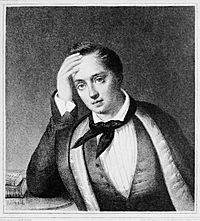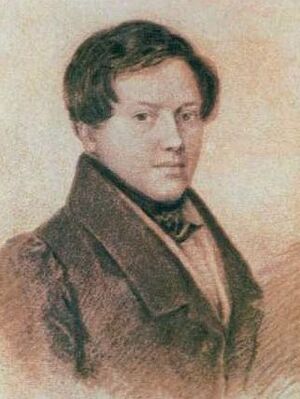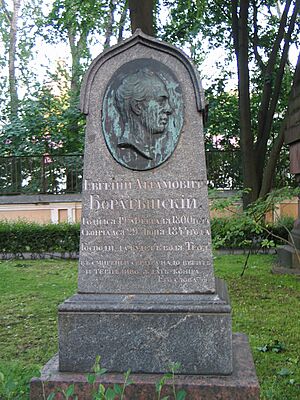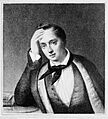Yevgeny Baratynsky facts for kids
Quick facts for kids
Yevgeny Baratynsky
|
|
|---|---|

Portrait of Baratynsky by Francois Frederic Chevalier, 1830s
|
|
| Born | Yevgeny Abramovich Baratynsky 2 March 1800 Vyazhlya, Kirsanov Uyezd, Tambov Governorate, Russian Empire |
| Died | 11 July 1844 (aged 44) Naples, Kingdom of the Two Sicilies |
| Occupation | Poet |
Yevgeny Abramovich Baratynsky (Russian: Евге́ний Абра́мович Бараты́нский; 2 March 1800 – 11 July 1844) was a famous Russian poet. He was known for his thoughtful and sometimes sad poems. A well-known poet named Alexander Pushkin even called him the best Russian poet who wrote elegies. Elegies are poems that often express sadness or reflection.
After a while, people didn't talk about Baratynsky's poems as much. But later, a group of poets called Russian Symbolists rediscovered his work. They saw him as a great poet who used deep ideas in his writing.
Contents
Life of Yevgeny Baratynsky
Yevgeny Baratynsky came from a noble family. He went to school at the Page Corps in Saint Petersburg. But when he was 15, he got into trouble and had to leave school early.
After three years living in the countryside, he felt very sad. He then joined the army as a private soldier.
In 1820, Baratynsky met another poet, Anton Delvig. Delvig helped him feel better and introduced him to the world of publishing. Soon, the army sent Baratynsky to Finland. He stayed there for six years. During this time, he wrote his first long poem called Eda. This poem helped him become well-known.
In January 1826, he married the daughter of a Major-General. With help from his friends, he was allowed to leave the army. In 1827, he settled in Muranovo, near Moscow. This place is now a museum about him. There, he finished his longest poem, The Gipsy. It was written in a style similar to Pushkin's poems.
Baratynsky seemed to have a happy family life. However, a deep sadness often stayed with him. This feeling also showed up in his poetry. He published several books of poems. Other famous writers, like Pushkin, praised his work highly. But the public didn't always like his poems as much. Some young journalists even made fun of them.
As time went on, Baratynsky's mood became even more sad and hopeless. He often wrote elegies, which are poems about loss or sorrow. He passed away in 1844 in Naples. He had gone there hoping the warmer weather would help him feel better.
Baratynsky's Poetry Style
Baratynsky's early poems tried to be different from Pushkin's. He admired Pushkin but wanted his own unique voice. Even his first long poem, Eda, was inspired by Pushkin's The Prisoner of the Caucasus. But Baratynsky's poem was more realistic. It had a simple style with a touch of emotion, but no strong romantic feelings.
His writing was always very precise and clear. The parts of his poems that describe things are especially good. He loved describing the wild nature of Finland.
His shorter poems from the 1820s are known for their sharp, clear sound. They are very direct and clean. Some of these short poems are light and playful, like those written by ancient Greek and Roman poets. He also wrote love elegies. These poems showed gentle feelings mixed with clever ideas.
In his later poems, written after 1829, Baratynsky became a "poet of thought." He was one of the best at using deep ideas as the main part of his poetry. This made him different from other poets of his time. Many people back then thought poetry should be mostly about feelings. His style was like a bridge between the clever poems of the 18th century and the deep, philosophical poems of the 20th century.
Baratynsky's writing style was classical. It followed the rules and models of earlier centuries. He tried to make his thoughts as short and strong as possible. Sometimes, this made his poems a bit hard to understand because they were so packed with meaning. His hard work in writing made his poems feel a bit delicate. This was very different from Pushkin's light and easy style. Baratynsky was also one of the first Russian poets to master long, complex sentences in his verse. These sentences often had many parts and side notes.
Baratynsky's Ideas
Baratynsky wanted people to connect more deeply with nature. He felt that humans were moving further and further away from the natural world. This desire for a more natural past was a big theme in his poems. He showed this by writing about the growing distance between the poet, who he saw as a child of nature, and other people. He felt that people were becoming too focused on industry and machines.
This made the poet feel more alone in the modern world. In his poem Rhyme (1841), he wrote that the only response a poet gets is from his own rhymes.
Baratynsky believed that the future of humans, with all their machines and factories, would be very bright at first. But he thought that this universal happiness would come at a cost. People would lose the higher values of poetry and art (as seen in his poem The Last Poet). He also thought that after a time of great thinking, humanity would lose its energy and die out. Then, the Earth would return to its original, wild state (in The Last Death, 1827).
These ideas, combined with his own deep sadness, led to some very powerful poems. They can be compared to the works of other poets who wrote about sadness, like Giacomo Leopardi. An example is his long poem Autumn (1837). It is a grand and formal poem about feeling down, but it also has a very personal touch.
Images for kids
See also
 In Spanish: Yevgueni Baratynski para niños
In Spanish: Yevgueni Baratynski para niños
 | Lonnie Johnson |
 | Granville Woods |
 | Lewis Howard Latimer |
 | James West |






